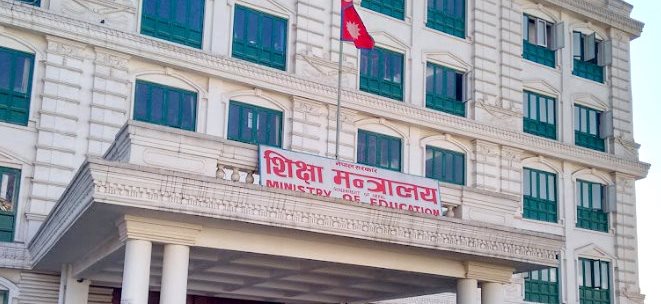Absence of Education Act allows federal government overriding powers

By Manjima Dhakal
Kathmandu, Apr. 25: The constitution of Federal Republic of Nepal grants different powers to different levels of governments. But, in reality, federal government has been taking all major decisions unilaterally, leaving local levels powerless.
The constitution hands local governments rights to manage school education, provincial government to sort out matters concerning higher education related with provincial university and federal government to oversee central university planning, among others.
But, in absence of Federal Education Act to clarify the constitution's provisions, a kind of lingering dispute has surfaced between federal and local governments as to who holds the rights to make decisions on critical matters.
A month or so ago, Ministry of Education, Science and Technology (MoEST) under the federal government had decided to shut down schools across the country for four days citing excessive air pollution as the cause. That announcement sparked a debate among the education stakeholders, who blamed the federal government for interfering in the rights stipulated for local governments.
Stating that some local governments including Biratnagar Metropolitan City, Bhimad Municipality, Tanahun, Bhadrapur Municipality, Jhapa, Rong Rural Municipality, Ilam Municipality and Maijogmai Municipality in Ilam had refused to comply, claiming that the pollution had no effect on them and so had no reason to close their schools, which they kept open.
The grudge of the local government against the central one is not limited to the issue of air pollution. They are equally unhappy with the federal government’s decision to close schools time and again citing the coronavirus pandemic. “The federal government can only suggest the local governments, but cannot impose their decision on us,” they complained.
Ashok Kumar Byanju Shrestha, Mayor of Dhulikhel Municipality and President of Municipal Association of Nepal, said, "Everyone should abide by the constitutional provisions. If the law cannot protect our rights, it must be amended."
“Since the federal government does not seem to understand the essence of federalism, they should undertake serious study on it,” he added, ironically.
He also shared the local governments have complete constitution-guaranteed jurisdiction over the matters concerning school education.
Bhim Parajuli, Mayor of Biratnagar Metropolitan City, remarked that the representatives of federal government didn’t want to relinquish their authority and that they should suggest the local government on crucial issues and not meddle in their rights.
However, Deepak Sharma, Spokesperson for the MoEST, said that the federal government had not interfered in the rights of local governments but that it acted in line with the legal provisions.
He added that these days local governments were exercising their rights, including appointment and transfer of teachers.
However, appointment of permanent teachers and operation of Secondary Education Examination (SEE) are being conducted by federal government in accordance with the prevailing laws, he shared.
Dr. Mana Wagle, an educationist, said federalism couldn’t be implemented fully in the education sector to date for lack of an all-powerful federal education act despite local levels having constitution-assured powers.
“Authorities’ lackadaisical attitude towards bringing a new education act is condemnable. All these disputes regarding which level of government has the jurisdiction over what affair will evaporate right away once that comes into effect and explains the provisions unequivocally,” he asserted.
Dr. Bipin Adhikari, a constitutional lawyer, said that the local level governments hold so many rights to govern themselves based on their interests but that the problems persisted was only because the implementation of the constitution was still in its early stages.
He informed that in terms of using exclusive powers, some local governments seem more capable than others to exercise them and that the federalism would be more robust in coming days as it would emerge stronger from its failings and mistakes.
“Federalism evolves out of its own experience,” he concluded.
Recent News

Do not make expressions casting dout on election: EC
14 Apr, 2022
CM Bhatta says may New Year 2079 BS inspire positive thinking
14 Apr, 2022
Three new cases, 44 recoveries in 24 hours
14 Apr, 2022
689 climbers of 84 teams so far acquire permits for climbing various peaks this spring season
14 Apr, 2022
How the rising cost of living crisis is impacting Nepal
14 Apr, 2022
US military confirms an interstellar meteor collided with Earth
14 Apr, 2022
Valneva Covid vaccine approved for use in UK
14 Apr, 2022
Chair Prachanda highlights need of unity among Maoist, Communist forces
14 Apr, 2022
Ranbir Kapoor and Alia Bhatt: Bollywood toasts star couple on wedding
14 Apr, 2022
President Bhandari confers decorations (Photo Feature)
14 Apr, 2022









